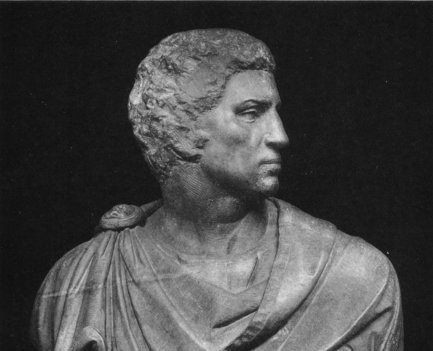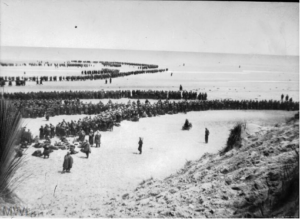Most people know the story of the assassination of Julius Caesar on the 15 March 44 B.C.E. Shakespeare made the event famous in his play Julius Caesar, and has left many saying “Beware the ides of March.”1 However, the assassination of Caesar may never have happened if Marcus Brutus had not agreed with Cassius. To understand the complete story of the assassination of Caesar, one has to understand the role that Marcus Brutus played.
Marcus Junius Brutus the Younger, better known as Brutus, is descended from Lucius Junius Brutus, founder and first consul of the Roman Republic in 509 B.C.E. The political future of Rome was so important to Lucius that he ordered his oldest two sons put to death for their desire to restore Rome to a monarchy. Lucius spared the life of his youngest son and it is through him that Marcus was born.2 Brutus’ own father, Marcus Brutus, was killed by Pompey the Great during a revolt.3
So who was this Brutus? He was a typical Roman, who received the traditional education of the Roman elite and was greatly influenced by the writings of Plato. Upon completion of his education, Brutus was given a position in the government.4 In both his marriage and in his public life, Brutus was expected to align with Caesar, but instead, he made his peace with Pompey the Great, eventually siding with him during the Roman Civil War in 49-48 B.C.E.5
Brutus was captured at the Battle of Pharsalus and spared by Caesar, causing Brutus to switch sides to Caesar.6 It is important to note at this time that Caesar had a special fondness for Brutus, believing Brutus was his son, born out of a love affair Caesar had with Servilia, Brutus’ mother. Out of this fondness, Caesar had instructed his commanders not to harm Brutus should he be captured in battle.7 Caesar pardoned Brutus for his role during the Civil War and gave him a high ranking government job. Brutus in turn convinced Caesar to give a government position to Cassius, Brutus’ brother-in-law.8
It was during this time following the Civil War that Caesar declared himself dictator of Rome, as allowed by the constitution during times of emergency, but not to last more than six months. Caesar wore the robe, crown, and scepter of the general, and called himself imperator. As leader of Rome, he had complete control over the armies. Many senators felt their power being threatened and feared that Caesar would soon appoint himself King of Rome.9
Cassius did not like Caesar, and soon began to plot to end his reign of power. He attempted to recruit his friends and fellow senators, but they refused to go along with Cassius unless he could convince Brutus to join them.10 Brutus had such an honorable reputation that his participation was crucial to the success of the cause. Brutus agreed to participate because of his family history in creating and protecting the Republic at its founding and the ensuing Roman tradition of opposing all forms of tyranny. Both Brutus and Cassius believed that once Caesar was dead, Rome would naturally return to the traditional Republic.11
The group of conspirators had heard that Caesar would be attending a senate meeting on March 15, and they planned the assassination for that day. They knew that it would not look suspicious, since they all had to attend the meeting of the senate and they believed that the Ides of March was a blessed day to make their move, since it was a religious holiday in Rome. Ironically, there was a statue of Pompey the Great, the leader Caesar had killed after the Civil War ended, in the portico where the assassination was to take place as soon as Caesar arrived. The conspirators believed it to be the perfect date and place to make their attempt to restore the Republic.12

However, on the planned day, Caesar was late and the conspirators became worried. When Caesar finally arrived, the senators surrounded him as he took his seat, and the attack began. All the senators attacked at once, creating a frenzy in which many of the them were stabbed in the process; even Brutus was stabbed in the hand. When that attack was over, Caesar was dead.13 The next day, Antonius (also known as Mark Antony), the sole remaining consul, granted all the conspirators amnesty, and distributed provinces to them as rewards. Brutus was given the province of Crete and moved there with his family where he continued to work for the government.14

Meanwhile, Octavian, Caesar’s nephew and heir, was brought to the capital to take Caesar’s place as leader of Rome. Octavian was angry that Antonius had pardoned the conspirators and when the common people of Rome learned of the assassination of Caesar, they too were angry that none of the conspirators had been punished. This rift between the people and the leaders began to cause a rift between Octavian and Antonius. Soon the leaders of Rome began to align themselves between Octavian and Antonius, and another war civil war began. Known as the Post-Caesarian Civil War, this war was between Octavian and his supporters and Antonius and his supporters in order to end the rift that had been growing. It did not take long for Antonius to be defeated by Octavian, resulting in a truce that joined their armies together. This is also when the Second Triumvirate was formed in 43 B.C.E. between Octavian, Antonius, and Marcus Lepidus allowing the three of them to rule Rome together.15
The next civil war in Rome, known as the Liberators’ Civil War, was fought between the Second Triumvirate and the liberators (those who assassinated Caesar and their supporters). Brutus and Cassius were the main targets of the Roman army and separately rallied troops to fight with them. Brutus, according to Plutarch, “was esteemed by the many for his virtues, but loved by his friends, admired by the nobles, and not hated even by his enemies.”16 Because of this, many people in Rome had faith in his motives and believed that while the other senators had murdered Caesar out of hatred and spite for his power, Brutus had participated because he truly wanted to end the tyranny that he believed Caesar had created in Roman government.17 Unable to defeat Octavian’s army, Cassius, fearing being captured, committed suicide.18
Unfortunately for Brutus, his army was not able to defeat the Roman army either, and he admitted defeat at the Battle of Philippi in 42 B.C.E. Also fearing being captured, Brutus fled to the hills with a good friend and fellow soldier. It was there that Brutus convinced his friend to take his sword and hold it upright, Brutus then fell upon his sword, killing himself. Antonius still held much respect for Brutus and had his body wrapped up in the finest purple cloth for the cremation. After he was cremated, his ashes were sent to his mother, since his wife was already dead, another suicide.19
Even after his death, Brutus served as a role model for senators and his story reminded emperors that they served at their own peril if they ignored the senate.20 Brutus did not end tyranny or civil war, with many battles leading to the loss of the Roman Republic. According to Shakespeare, Brutus acted out of honor to protect his home from a tyrant. Dante placed Brutus in the worst level of Hell in the mouth of Satan next to Judas Iscariot.21 Either way one remembers Brutus, one must remember the conspiracy would never have gotten anywhere without the participation of Brutus.
- William Shakespeare, Julius Caesar (Boston: Ginn and Company, 1908), Kindle edition, Act 1 scene 2. ↵
- Salem Press Biographical Encyclopedia, January 2017, s.v. “Marcus Junius Brutus,” by Michael Witsoki. ↵
- Salem Press Encyclopedia, January 2016, s.v. “Brutus,” by Richard Westall. ↵
- Salem Press Biographical Encyclopedia, January 2017, s.v. “Marcus Junius Brutus,” by Michael Witsoki. ↵
- Salem Press Encyclopedia, January 2016, s.v. “Brutus,” by Richard Westall. ↵
- Salem Press Encyclopedia, January 2016, s.v. “Brutus,” by Richard Westall. ↵
- Plutarch, Plutarch’s Lives Volume IV (London: George Bell & Sons, 1892), 402, Project Gutenberg, https://www.gutenberg.org/files/44315/44315-h/44315-h.htm#Page_398 (accessed October 23, 2017). ↵
- Plutarch, Plutarch’s Lives Volume IV (London: George Bell & Sons, 1892), 404-405, Project Gutenberg, https://www.gutenberg.org/files/44315/44315-h/44315-h.htm#Page_398 (accessed October 23, 2017). ↵
- Funk & Wagnalls New World Encyclopedia, 2016, s.v. “Caesar, Gaius Julius.” ↵
- Plutarch, Plutarch’s Lives Volume IV (London: George Bell & Sons, 1892), 407-408, Project Gutenberg, https://www.gutenberg.org/files/44315/44315-h/44315-h.htm#Page_398 (accessed October 23, 2017). ↵
- Salem Press Biographical Encyclopedia, January 2017, s.v. “Marcus Junius Brutus,” by Michael Witsoki ↵
- Plutarch, Plutarch’s Lives Volume IV (London: George Bell & Sons, 1892), 410-412, Project Gutenberg, https://www.gutenberg.org/files/44315/44315-h/44315-h.htm#Page_398 (accessed October 23, 2017). ↵
- Plutarch, Plutarch’s Lives Volume IV (London: George Bell & Sons, 1892), 413, Project Gutenberg, https://www.gutenberg.org/files/44315/44315-h/44315-h.htm#Page_398 (accessed October 23, 2017). ↵
- Plutarch, Plutarch’s Lives Volume IV (London: George Bell & Sons, 1892), 416, Project Gutenberg, https://www.gutenberg.org/files/44315/44315-h/44315-h.htm#Page_398 (accessed October 23, 2017). ↵
- Plutarch, Plutarch’s Lives Volume IV (London: George Bell & Sons, 1892), 418-419, Project Gutenberg, https://www.gutenberg.org/files/44315/44315-h/44315-h.htm#Page_398 (accessed October 23, 2017). ↵
- Plutarch, Plutarch’s Lives Volume IV (London: George Bell & Sons, 1892), 425, Project Gutenberg, https://www.gutenberg.org/files/44315/44315-h/44315-h.htm#Page_398 (accessed October 23, 2017). ↵
- Plutarch, Plutarch’s Lives Volume IV (London: George Bell & Sons, 1892), 425, Project Gutenberg, https://www.gutenberg.org/files/44315/44315-h/44315-h.htm#Page_398 (accessed October 23, 2017). ↵
- Plutarch, Plutarch’s Lives Volume IV (London: George Bell & Sons, 1892), 443-446, Project Gutenberg, https://www.gutenberg.org/files/44315/44315-h/44315-h.htm#Page_398 (accessed October 23, 2017). ↵
- Plutarch, Plutarch’s Lives Volume IV (London: George Bell & Sons, 1892), 449-453, Project Gutenberg, https://www.gutenberg.org/files/44315/44315-h/44315-h.htm#Page_398 (accessed October 23, 2017). ↵
- Salem Press Encyclopedia, January 2016, s.v. “Brutus,” by Richard Westall. ↵
- Kim Zarins, “‘Et tu, Brute?'” Calliope 17, no. 4 (December 2006): 42-44. ↵



83 comments
Michael Thompson
The way that Brutus is painted is like he was a dirty traitor who killed a man who loved him. But the real story is that he was just trying to do the right thing for his nation, despite the fact that he probably loved Caesar himself, and him doing that was probably hard on him. But like in Dante’s Inferno with Judas and Cassius, all he is in history is a traitor, when all he was really doing was sacrificing to do the right thing, and not really recognized for it, which I find sad.
Todd Brauckmiller
Always a surprise to find out that there’s more to a story, everything I just read in this article I had no clue happened. These men developed so much hatred for Caesar that they decided to just kill him off. Makes you think how different the reaction would have been if something like that happened today. It would be safe to assume that those conspirators would not go unpunished. Though was a very action filled article had no clue how much influence Brutus had to the other followers. At that time I guess he did what he felt was the right thing to do, who knows anything could have happened that day.
Nelly Perez
Brutus was a part of murdering Caesar, but later on, he tried to be the hero for Rome. Mark Anthony forgave him and the rest of the conspirators for what they did which made people upset. He, Cassius, and others fought in a civil war. He became a role model for Rome and his story left a message for the emperors that came to follow.
Jake Mares
It is sad to see an actual just senator like Brutus still meeting the end that he did. Despite being the model senator serving the better Rome, his life was still plagues with war and conspiracy and death. His legacy definitely still remains as his name is well-known today. I was shocked that the Romans would bring Caesar’s son to power as if he would not have some similar motives as his father.
Amanda Quiroz
Wow. This article really grabbed my attention. Brutus attacked Caesar for an honorable reason (to end tyranny) while the others who acted out lusted for power themselves. I’ve never read this deep into the assassination of Caesar before. It opened my eyes that Brutus played an important role when it comes down to it. Imagine if he hadn’t done so.
Patricia Arechiga
Its pretty fascinating to me the extreme measures and actions taken in order to not sustain a tyranny in Rome. I won’t lie it is pretty sad to see that the senate killed one of their own out of ‘fear’ and ‘anger’. However, the will that Brutus had to kill Ceaser even well after the fact that Ceaser had basically adopted him as his son and given him a good government job is wicked. I guess it could make sense as to why Brutus turned on Ceaser as he did come from a family line that help start Rome with the intention of keeping rome as a republic. Either way, the entire story is interesting. It is always those we keep closest that we should fear the most.
Ariana Brown
Wow. This really does make a Shakespearean drama with at least 2 suicides, many deaths and the argument of betrayal and good versus evil. With this being said, the philosophical question could also be asked in Brutus is really a good man because his loyalty shifted to 3 different people through out this time period. This also begs the question whether loyalty is more valuable than the greater good, which is left up to judgement, which can be skewed when power is involved. This has honestly been more insightful into the philosophical questions behind the Ides of March as well as the dramatics behind it.
Antonio Coffee
I feel like Brutus is one of the people most deserving of attention during the transitional period yet the one that gets it the least amount of attention. Brutus was the lynchpin of this whole period. Without him, the course of history could have been drastically altered if it were not for Brutus’ assistance. I am grateful to this article for paying attention to what Brutus did after the war and I learned why Brutus was so dear to Ceaser.
Diego Terrazas
Brutus was a crucial component towards the assassination of Julius Caesar, in effort to convert Rome back into a republic instead of a dictatorship. It is a shame when political issues leads friends/families astray. I believe Brutus did not personally dislike Julius but thought his death was in the best interest of the people. Unfortunately, that may have proved to be the wrong decision.
Christopher Hohman
Nice article. I have learned about the assassination of Ceaser before, but I never knew of the important role that Brutus played. His family was so important to the founding of the original republic and Brutus knew this. He believed that Ceaser was corrupting the institutions that his family had helped create. I do not think he hated Cesaer he felt duty bound to help with the assassination.